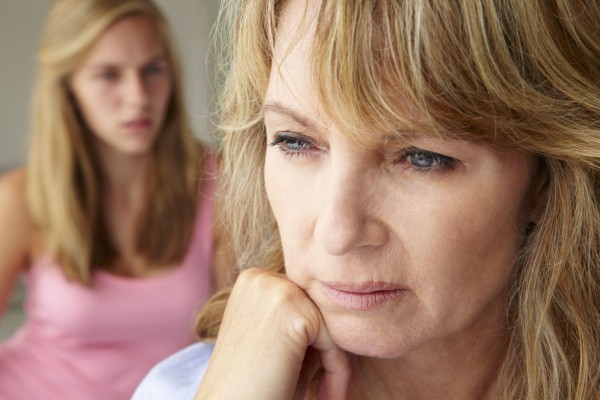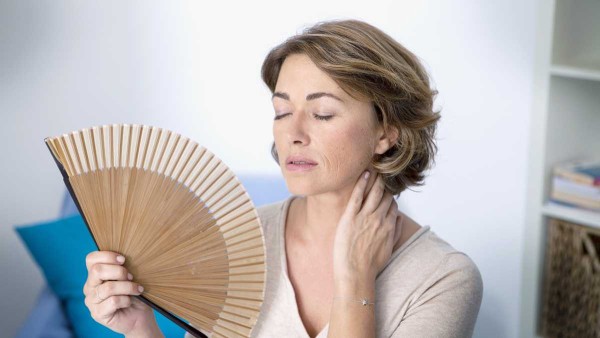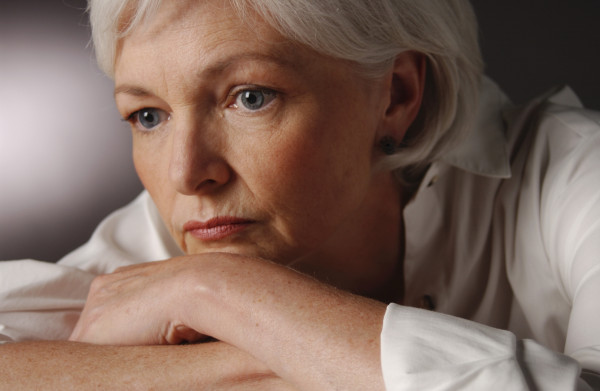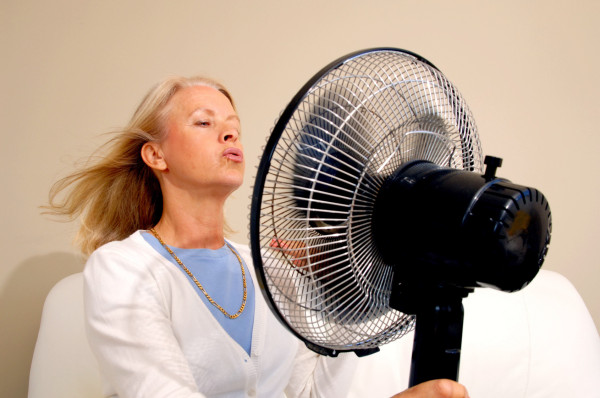"Transitional age": menopause
Sooner or later, every woman begins to feel the approach of a special period in her life, when her reproductive ability decreases. This condition is called menopause. Many treat menopause as a disease, but it is important to understand that this is just another stage in a woman's life. You need to be ready for it and not be afraid.
Content
Causes of menopause
Menopause occurs due to the reorganization of the endocrine system of a woman, under the influence of which the hormonal background of the body changes. Sometimes a woman develops an early menopause. This is due to a strong shock, various surgical interventions and injuries. This usually happens as a result of a severe shock of a moral and psychological nature. Operations related to the removal of the internal genital organs of a woman, for example, uterus or ovaries also bring menopause closer. In addition to physical trauma, during such operations, a woman is also inflicted with a moral and psychological injury. The woman feels unattractive, old, or barren.
 Other reasons also affect the timing of the onset of menopause - genetic predisposition, diseases of the endocrine system, bad habits and an immoral lifestyle, emotional state, mental disorders.
Other reasons also affect the timing of the onset of menopause - genetic predisposition, diseases of the endocrine system, bad habits and an immoral lifestyle, emotional state, mental disorders.
Menopause in women: age
On average, according to experts, the onset of menopause occurs at the age of 45-55 years. But these did not show the standard. Approximately 5% of women do not experience signs of menopause even at an older age, and about 8% of women notice the first symptoms of menopause at the age of 40.
 To determine the critical age for yourself, ask your relatives at what age they felt the first symptoms of menopause, how it passed. It is likely that your menopause will develop according to the same scenario. This does not apply to those cases where the cause of menopause consisted of surgery. Remember that it is impossible to name the exact time of the onset of menopause for each specific woman.
To determine the critical age for yourself, ask your relatives at what age they felt the first symptoms of menopause, how it passed. It is likely that your menopause will develop according to the same scenario. This does not apply to those cases where the cause of menopause consisted of surgery. Remember that it is impossible to name the exact time of the onset of menopause for each specific woman.
Menopause symptoms
It is difficult to unequivocally determine the first symptoms of the approaching menopause. Each woman has her own. But there are several characteristic symptoms most commonly experienced by a woman. First of all, menstrual irregularities should be attributed to symptoms of this kind. In this case, menstruation goes without any system.
At first there may be delays for several days, then this interval increases to several weeks and months. Women begin to feel sudden flashes of heat in the upper half of the body and head, the so-called "hot flashes". Many women develop abnormal heart rhythms. Due to hormonal changes, body weight increases, sleep worsens, often torments insomnia.
 If you notice one of these symptoms in yourself, you do not need to worry and diagnose yourself in advance. Perhaps this is only a temporary single phenomenon. If the symptom has firmly entered your life, then it's time to admit that you have entered the initial phase of menopause.
If you notice one of these symptoms in yourself, you do not need to worry and diagnose yourself in advance. Perhaps this is only a temporary single phenomenon. If the symptom has firmly entered your life, then it's time to admit that you have entered the initial phase of menopause.
How menopause begins
The beginning of the period of decline in fertility can be judged by the presence of several symptoms. In women, all the signs of this condition may appear, or there may be only a part of them. From the level of the hormone estrogen in the woman's body and the rate of its decline, one can judge how difficult this condition will be tolerated. So with an initially low level of estrogen and a slow decrease in it, a woman will not feel much discomfort. If estrogen levels are high, it will be difficult to manage symptoms.
 What should you pay attention to? Where does the withering of a woman begin:
What should you pay attention to? Where does the withering of a woman begin:
- Tides. In this state, a woman feels heat in the neck and head, the skin turns red, sweat appears. This state lasts for about five minutes.
- Headache.
- Sleep problems are extremely common in the onset of menopause. Insomnia drains a woman both physically and mentally.
- Depression is very common in menopause. The younger the woman is, the stronger the depression.
- A woman feels helpless, often cries for no reason.
- Changes in metabolism. This applies primarily to carbohydrate metabolism. Sugar often rises in women.
- Sex drive fades away, the vagina becomes dry, body weight increases due to the weakening of the thyroid gland.
This list covers all the symptoms of approaching menopause. But depending on the individual condition of each woman, it can change.
How long does the climax last
It is unambiguously difficult to answer the question about the duration of menopause. Here, heredity often plays a decisive role. It is likely that a woman's menopausal manifestations will last as long as close relatives of an older age.
In medicine, it is customary to divide menopause into three stages:
- Premenopause begins from the moment when the first signs of menopause appear until the complete cessation of regular menstruation. This period takes approximately five years. Although for some women, it can be short - only a few months.
- Menopause begins with the last menstrual period and lasts exactly one year.
- During postmenopause, all unpleasant symptoms stop. This condition begins a year after the last menstruation and continues until the end of life.
Menstruation with menopause and after
During the premenopausal period, the first functional changes in the body begin. This condition can last for up to six years. It was during this period that the first irregularities on the part of the menstrual cycle are observed. Menstruation becomes scanty, and the duration of the cycle is disrupted. This indicates the extinction of ovarian function and insufficient production of the hormones estrogen and progesterone. The reproductive function of a woman decreases, it becomes more difficult for her to become pregnant.
 If, in premenopausal women, a woman suddenly has heavy periods, it is necessary to urgently consult a gynecologist. Such a symptom may indicate an oncological disease of the reproductive system, which is very vulnerable in this period. After establishing the cause of heavy menstruation, the doctor will prescribe the necessary treatment.
If, in premenopausal women, a woman suddenly has heavy periods, it is necessary to urgently consult a gynecologist. Such a symptom may indicate an oncological disease of the reproductive system, which is very vulnerable in this period. After establishing the cause of heavy menstruation, the doctor will prescribe the necessary treatment.
After the last menstruation, ovulation finally stops and a real menopause sets in. A year after the last menstrual flow, it is considered abnormal that menstruation has begun again. At this time, the discharge of blood from the genitals is even dangerous to health. This may indicate diseases of the internal genital organs, which are characterized by bleeding - endometriosis, uterine cancer, and various inflammatory processes.
As an exception, very scanty prolonged discharge from the genitals is allowed, reminiscent of menstruation when taking hormone-containing drugs. This is considered an acceptable way to delay the approach of old age. Such medicines can only be recommended by a specialist; it is categorically impossible to take them on your own.
Hot flashes with menopause
The main sign of an approaching climax is hot flashes. These unpleasant conditions begin a couple of years before the onset of menopause and last from several months to 15 years. The vast majority of women experience them. Hot flashes are most difficult for women who start menopause early.
 Hot flashes are caused by changes in hormone levels in the body. Estrogen is responsible for the body's thermoregulation. A decrease in its level is perceived by the brain as a signal of overheating of the body. An emergency discharge of thermal energy occurs: the heart beats at an accelerated pace, blood vessels dilate and sweat is released.
Hot flashes are caused by changes in hormone levels in the body. Estrogen is responsible for the body's thermoregulation. A decrease in its level is perceived by the brain as a signal of overheating of the body. An emergency discharge of thermal energy occurs: the heart beats at an accelerated pace, blood vessels dilate and sweat is released.
Hot flashes are handled differently by women. Attacks can occur up to 30 times a day and last up to several minutes.
At the same time, the woman feels a strong heartbeat, a rush of heat to her face, after which she breaks through profuse sweat and chills. However, sweating can be very intense. Sometimes you even have to change clothes. All this leads to the appearance of an unpleasant odor. Sometimes attacks are complemented by nausea, headache, anxiety and dizziness. All of these symptoms cause self-doubt and depression.
The onset of hot flashes can be controlled. It is important to analyze the circumstances under which an attack usually occurs and to find out what triggers it. Remember:
- Where were you during the attack, what was the temperature there.
- The hour at which the tide began.
- The strength and duration of the attack.
- Foods and drinks that you consumed shortly before the attack.
- Whether you were stressed or tired.
- What did you do to reduce the seizure.
By answering these questions, you can develop tactics to prevent or treat seizures quickly.
Menopause treatment
It is possible and even necessary to alleviate the condition with menopause. This will allow the woman to get out of depression, suffer less from hot flashes and lead a normal life.
To reduce the severity of hot flashes, you need to follow these rules:
- Eat a diet that is free of salty, spicy, and fatty foods. Enrich your diet with whole grain breads, fresh vegetables and fruits, and dairy products.
- Drink plenty of water. This will replenish the moisture loss that occurs with sweat production.
- Limit alcohol and caffeine.
- Increase your physical activity. Even if you have never played sports, now is the time to start. Move on foot, walk more. Exercise improves mood and relieves depression. It is an excellent prevention of osteoporosis and heart disease.
- Avoid synthetic clothing. Natural fabrics absorb sweat better and do not cause overheating. This will help reduce the frequency of hot flashes. Keep your neck open and wear multiple layers of clothing. At the beginning of the tide, you can remove the jacket and thereby stop it.
- Shower often, preferably 2 times a day. Use antibacterial soaps to neutralize sweat odor and deodorants.
- Don't take on too much responsibility. This will help avoid stress.
- Engage in relaxation and meditation, yoga.
- For vaginal dryness, use a special lubricant.
Hormones with menopause
In order to alleviate the condition of a woman with menopause, hormonal therapy is prescribed. It helps to get rid of hot flashes, vaginal burning, osteoporosis and normalize sexual function.
 Hormonal drugs make up for the lack of estrogen and progesterone in the body and completely relieve a woman of the signs of menopause. To find the right drug and its dosage, blood tests for hormone levels are first done.
Hormonal drugs make up for the lack of estrogen and progesterone in the body and completely relieve a woman of the signs of menopause. To find the right drug and its dosage, blood tests for hormone levels are first done.
Taking hormonal drugs can come with side effects, especially if the dosage is incorrect. In this case, non-hormonal agents may be prescribed. Usually drugs containing phytoestrogen are prescribed. But these drugs have too low hormone levels, so it can be difficult to calculate the dosage for an effective treatment.
In any case, a specific drug and its dosage are selected by the doctor for each woman individually. This is the only way to talk about effective treatment and minimal side effects.
The duration of taking hormonal drugs depends on the duration of the manifestation of menopause symptoms and can range from three to five years. At the same time, it is best to start hormone replacement therapy with creams, patches and gels with a low content of hormones. They practically do not give side effects.
Vitamins for menopause
To maintain the body during menopause, a woman needs to take vitamin complexes. They will help improve your physical and emotional well-being.
It is useful for a woman to use vitamin E, which prolongs and activates the function of the ovaries. It stimulates the production of hormones and has a positive effect on the functioning of the heart. Vitamin A has an antioxidant effect, prevents the development of tumors, and has a beneficial effect on the skin. Vitamin C has the same useful property. Vitamin D is useful for the prevention of osteoporosis. To normalize sleep, it is necessary to consume B vitamins.
It is best to use special vitamin and mineral complexes designed for women in menopause: Extrovel, Feminal, Femikaps. They have a balanced combination of minerals and vitamins. These drugs provide relief during hot flashes. You need to take them from the beginning of the manifestation of the first symptoms until the end of life.
After menopause
Usually, the period when all the uncomfortable manifestations of menopause end is called "golden autumn" in a woman's life. Indeed, during these years a woman becomes calm and wise, she will have a bright and rich old age. However, we must not forget about the age and some of its features.
At this time, the subsequent extinction of the function of the ovaries occurs, the mode of operation of the heart also changes, vision and hearing decrease. To feel active and healthy, you need to alternate between moderate physical activity and active rest, adhere to the principles of proper nutrition. Cut back on meat, eggs, and fat in your diet. This will help reduce the risk of vascular sclerosis. Fermented milk products, vegetables, fruits, fish and nuts, on the contrary, are good for the body at this age.
Vigorous exercise will reduce the risk of coronary heart disease and diabetes... You can just walk in the park or do morning exercises, swim in the pool. All this will give you vigor and make you feel better. In addition, exercise is an excellent prevention of osteoporosis.
At this age, it is very important for women to maintain a sleep schedule. You must sleep at least seven hours. Sleeping longer is also harmful - the risk of "earning" a stroke increases. During sleep, the body is renewed - the cells restore their working capacity, metabolic products are removed from the body.
Sex after menopause
Many women do not experience problems with sex drive after menopause. On the contrary, sex takes on new colors during this period. After all, the level of female sex hormones does not in any way affect a woman's ability to experience pleasure in the act of love. The risks associated with unwanted pregnancy disappear and the woman relaxes, getting new pleasure.
 Problems associated with a decrease in sex drive during this period arise for psychological reasons. The depressive state also affects the sex drive. Many women tend to think that they are becoming less desirable in the eyes of their partner. But in fact, this problem should be approached from the other side. Experience and knowledge of her body make a woman more attractive. She is more relaxed and skilled in matters of sex. Often, women start doing yoga, pilates, or fitness. This makes their body more flexible and obedient, they are liberated internally.
Problems associated with a decrease in sex drive during this period arise for psychological reasons. The depressive state also affects the sex drive. Many women tend to think that they are becoming less desirable in the eyes of their partner. But in fact, this problem should be approached from the other side. Experience and knowledge of her body make a woman more attractive. She is more relaxed and skilled in matters of sex. Often, women start doing yoga, pilates, or fitness. This makes their body more flexible and obedient, they are liberated internally.
If a woman experiences pain during sex due to vaginal dryness, then this problem can be solved simply. It is enough to prolong the foreplay or use special lubricants. With menopause, a woman's vagina becomes more susceptible to infection due to an increase in alkali levels. In this case, a course of hormonal therapy is required. And, of course, you should definitely use a condom.






Thanks for such a helpful article.